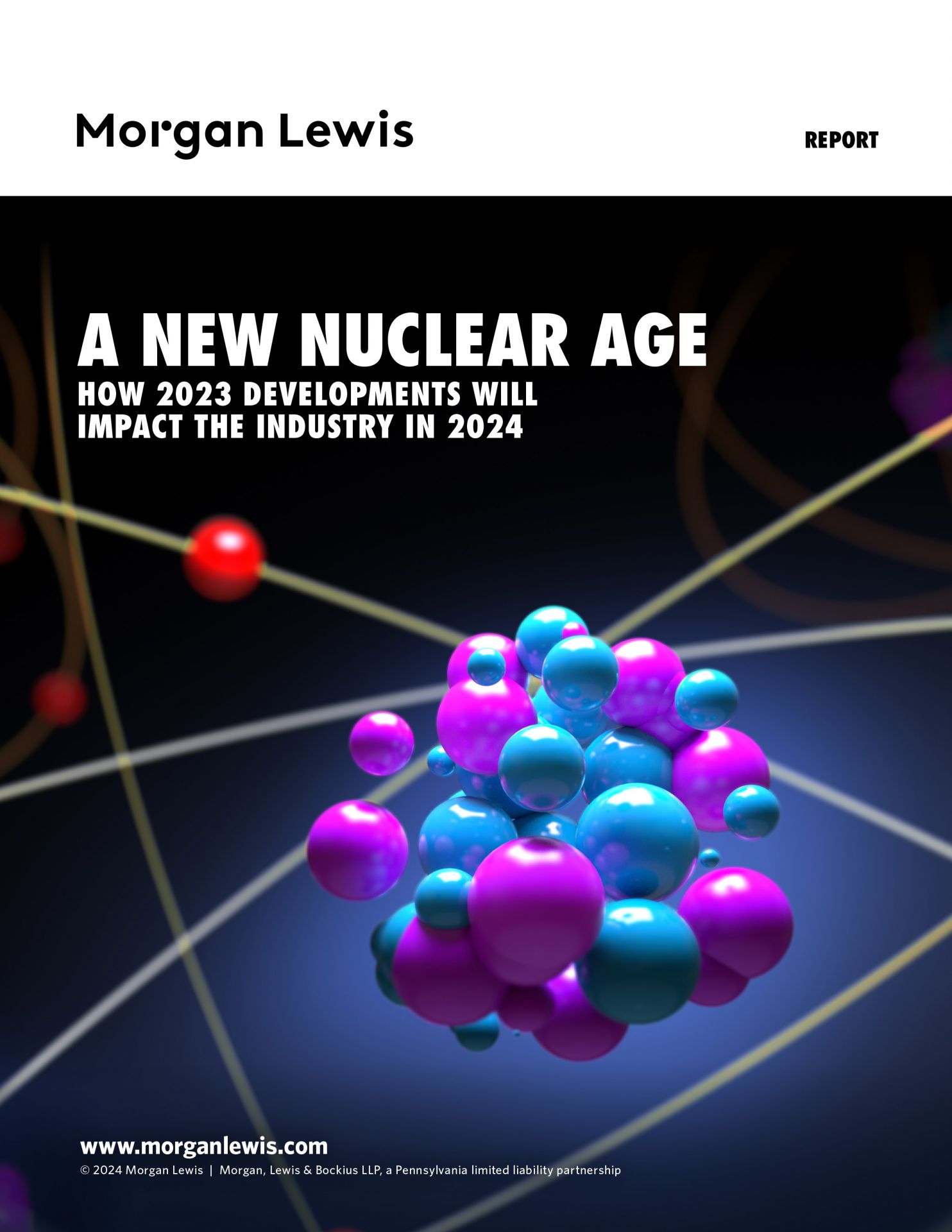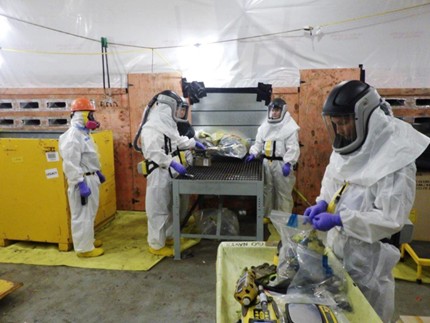Report examines nuclear’s 2023 developments, 2024 trends
 A new report, A New Nuclear Age: How 2023 Developments Will Impact the Industry in 2024, has been released by Morgan Lewis, a global corporation that provides litigation, corporate, labor and employment, and intellectual property services. Morgan Lewis’s energy specialist attorneys, who compiled the report, reviewed recent developments in rules and guidance from the Nuclear Regulatory Commission and Department of Energy that have impacted various aspects of the nuclear energy industry. Covered areas include cybersecurity, small modular reactors, advanced reactors, sustainability, export controls, plant decommissioning, microreactors, and fusion systems. Also considered in the report are potential future developments that may further affect the nuclear industry this year.
A new report, A New Nuclear Age: How 2023 Developments Will Impact the Industry in 2024, has been released by Morgan Lewis, a global corporation that provides litigation, corporate, labor and employment, and intellectual property services. Morgan Lewis’s energy specialist attorneys, who compiled the report, reviewed recent developments in rules and guidance from the Nuclear Regulatory Commission and Department of Energy that have impacted various aspects of the nuclear energy industry. Covered areas include cybersecurity, small modular reactors, advanced reactors, sustainability, export controls, plant decommissioning, microreactors, and fusion systems. Also considered in the report are potential future developments that may further affect the nuclear industry this year.
The following text summarizes some of the report’s main points.
Cybersecurity: The report notes that the NRC revised its guidance for cybersecurity in 2023 for the first time in more than a decade:
The new guidance clarified the type of cyberattacks that require notification to the NRC, the timeliness and method for making such notifications, and how to submit follow-up written reports to the NRC. It also provided insights gained from actual cybersecurity attacks, while accounting for new technologies and updates based on the latest guidance from the National Institute of Standards and Technology and the International Atomic Energy Agency. The guidance also requires nuclear power plants to document how they have achieved “high assurance” that their networks are adequately protected from cyberattacks.
Emergency preparedness: The report mentions that the NRC recently finalized a rule on emergency preparedness for SMRs and advanced reactors that “moves away from the one-size-fits-all approach for larger reactors and recognizes the inherent safety features of newer reactor designs, allowing for more targeted emergency planning based on specific risks.” It continues:
Under the new framework, SMRs and advanced reactors can develop emergency plans based on their ability to demonstrate effective emergency response through drills and exercises. It also allows for emergency planning zones to be determined by the potential consequences of an accident, rather than a fixed distance.
Microreactor licensing: Late last year, according to the report, “the NRC’s Advisory Committee on Reactor Safeguards endorsed the NRC staff proposal for licensing microreactors. The proposal would allow factory-built microreactors with features that preclude criticality to be loaded with fuel and undergo operational testing at the factory before being transported to an installation site.” This proposal, if approved by the full commission, “would create a lower regulatory burden in line with the anticipated decreased potential safety hazards posed by such microreactors.”
Fusion energy: In regard to fusion energy systems, the NRC has begun to “develop a regulatory framework . . . and issued preliminary proposed rule language for the licensing and oversight of a broad array of fusion systems currently under development,” the report states. The NRC “decided to modify the existing process for licensing the use of ‘byproduct materials’ contained in 10 CFR Part 30. This is significant because the process to obtain a Part 30 license is far less onerous than the process to obtain a license as a nuclear power facility.”
According to the report, the proposed NRC rule defines a fusion system as “a system that, through use of byproduct material or to produce byproduct material, induces nuclear fusion and includes any associated radiation, radioactive material, and supporting structures, systems, and components that are used to contain, process, or control radiation and radioactive materials.”
Environmental regulation: In early 2023, the NRC approved publication of a proposed rule to update its environmental regulations, as well as a draft update to its generic environmental impact statement for license renewal of nuclear plants (GEIS). The report explains:
The proposed rule aims to bring clarity to the subsequent license renewal process and would allow environmental reviews of pending applications to resume. If finalized, the rule would remove the limitation of “initial” license renewal, making clear that the environmental assessment “applies to applications for initial or subsequent license renewal.”
For the GEIS update, the NRC staff “identified 80 environmental issues—including newer issues like the impact of greenhouse gases—associated with operations and refurbishment.”
Hydrogen and decarbonization: The report notes that the Nine Mile Point Nuclear Station began producing hydrogen in 2023 as part of a DOE demonstration project, validating the idea “that reliable and emission-free nuclear energy can be used to produce clean-burning hydrogen, which is vital to overall decarbonization efforts.” The report continues, “The DOE has offered funding opportunities to improve the ability to economically produce the large volumes of hydrogen needed for commercial use. It also recently established seven ‘hydrogen hubs’ throughout the nation.”
Export controls: The DOE has “made changes to the list of countries eligible for general authorizations under 10 CFR Part 810. The updates included granting Mexico the status of a fully generally authorized destination, while removing Colombia and Egypt from the list of countries eligible for a general authorization.”
The report also states that the NRC has published an order “suspending the general license to export special nuclear material, source material, and deuterium for nuclear end use to China. Under the order . . . any person wanting to send those materials to China must apply for, and receive, a specific license prior to export.” This order “was part of a larger U.S. government determination that more oversight and control of the exportation of these materials—which can be used for both commercial and military purposes—is necessary to further the national security interests of the United States,” The report explains.
Decommissioning and spent fuel: The NRC last year issued a number of rule updates regarding the funding and expense for decommissioning retired nuclear plants, which the report explains. For example, a proposed rule titled “Alternatives to the Use of Credit Ratings” would amend the decommissioning financial assurance mechanisms in 10 CFR Part 30—as is also explained in the Up & Atom blog that Morgan Lewis uses throughout the year to track developments in the nuclear industry.
Another NRC rule revision provided updates to waste burial cost estimation factors, with increases for pressurized water reactors and decreases for boiling water reactors. A draft interim staff guidance reemphasized limitations on the use of funds previously reported to the NRC as providing radiological decommissioning funding assurance.
In regard to spent fuel, the report notes that the DOE “updated its ‘road map for implementing a consent-based siting process’ for storing used nuclear fuel. The update incorporated public feedback, clarified the focus of the DOE’s used fuel siting efforts, and provided aspirational timelines for project development. The new plan includes a greater emphasis on environmental justice, an increased role for potential host communities, and increased funding opportunities to support meaningful community participation.”
Trends for 2024: A number of “trends to watch in 2024” were highlighted, including the following:
- Continued momentum for advanced nuclear reactor development, with more applications for NRC construction permits being filed for such reactors.
- Expanded efforts by the DOE to ensure a domestic supply of enriched uranium.
- The NRC will finalize updates to its environmental impact statements for operating plants seeking license renewals.
- Congress will renew the Price-Anderson Act for at least another 20 years.
- Nuclear export controls will likely become more stringent for recipients in China and Russia.
- New 123 Agreements with countries in emerging nuclear markets are anticipated.





